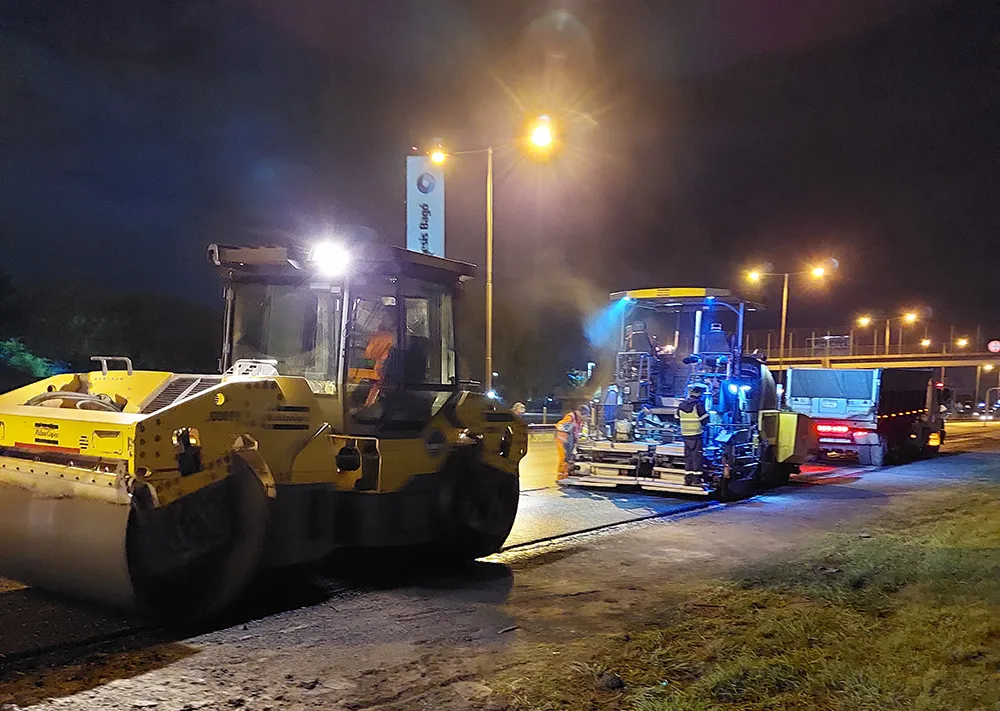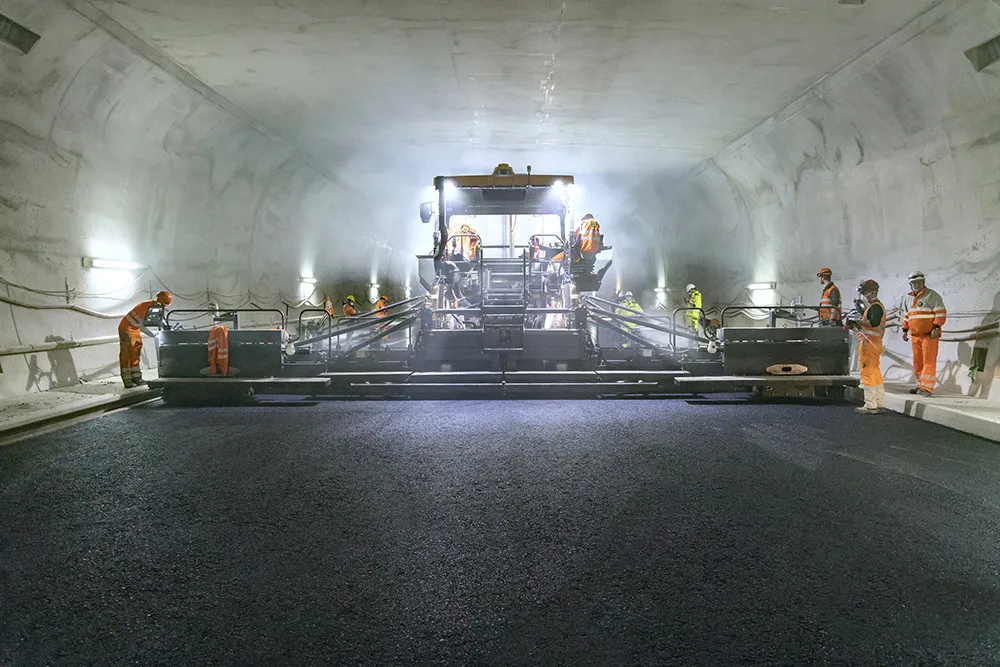
There are a few common themes in the bitumen technology stories in this issue. One is the slow spread of warm mix; in the UK its use is moving from national to regional roads and in South America, a trial to combine RAP and warm mix could encourage its wider application. We also see the impact that private concessionaire companies can have on advancing the adoption of technologies. Argentina, Autopistas del Sol is being pro-active in reducing cost and carbon emissions while maintaining performance, and in the UK, Connect Plus is pushing ahead with Shell’s AgeSafe technology in a bid to replace surfaces less often, potentially saving cost, carbon and congestion. Meanwhile, a study in the state of New York demonstrates why road authorities everywhere should look into chipsealing sooner rather than later.
Argentina trials warm mix-RAP combo
A ground-breaking trial in Argentina has seen the combination of warm mix technology and RAP in the wearing course of the busy Pan-American Highway, Route 9. Working for highway operator Autopistas del Sol (Ausol), contractor Construcciones Ingevial was able to use RAP from the same highway to produce the mix which contains a modified bitumen binder.
According to bitumen technology consultant Mario Roberto Jair who worked on the project, although both warm mix asphalt (WMA) and RAP have been possible within the national highway specification since 2017, this is the first time that the two technologies have been combined. Before Ausol laid the section using both WMA and RAP in October 2022, it first laid a section with 15% RAP in March 2-22.
Both trials involved 500tonnes of mix laid on a 1km stretch of the Pan-American Highway. The 30mm-thick wearing course is a thin layer with high microtexture. Often RAP is only used in the lower layers of the road, but here wearing course becomes wearing course again. “This is reuse not recycling,” says Jair.
The fact that Ausol is a private company means that it is more likely to trial innovative technologies, says Jair, because they are better placed to manage and minimise the risk: “Private owners have a certain freedom to make decisions, because they are responsible for their successes and mistakes,” he says.
An important element of the acceptance and governance process was making sure that the results obtained onsite matched those from laboratory tests, which took place over a six-month period. “In this way, the concession authorities trusted in the benefits of the solution offered,” says Jair.
Jair was involved in the introduction of low temperature bunders to Argentina back in 2010 when he worked as technology manager for Shell Bitumen in the Americas. “I was involved in the placement and supervision of more than 200,000tonnes of warm mixes, based on chemical additives.”
The widespread use of RAP has yet to be established, however. “The use of RAP is just beginning but so far not in ‘special’ wearing courses, like this one. And warm mix technology is not yet in mass use, despite of good experiences,” says Jair.
Assuming these sections perform as expected, Ausol can now add the combination of warm mix and RAP to its range of solutions. “The idea is that the next resurfacing and maintenance projects will incorporate the RAP generated as part of the new mixes to be used,” says Jair “Suitable percentages have been in the order of 15 to 20%. And hopefully other projects at the national level will incorporate these options.”
Liverpool goes warm
Liverpool County Council opted to use warm mix asphalt for the resurfacing of Liverpool’s Lark Lane – and then offset carbon emissions to make it a carbon neutral project.
The UK’s strategic road network owner National Highways announced in August 2021 that it was accelerating the use of warm mix by demanding that contractors use it; warm mix had been allowed since 2015, but only with permission to make a departure from the specification. The use of warm mix is less common among regional and local road authorities. This means that it takes more time and effort to convince highway departments and engineering firms to work with technology that is new to them. However, it can bring a series of benefits.

Using warm mix, which requires less heating at the asphalt plant, saves on fuel and carbon. Liverpool County Council elected to offset the remaining 16tonnes of carbon through a package that CEMEX calls a ‘CarbonNeutral Asphalt Product’. CEMEX says that the carbon was offset in line with The CarbonNeutral Protocol, an open standard operated by Climate Impact Partners which is revised annually.
Liverpool’s Lark Lane is a busy street of boutique shops, cafes and restaurants which meant that the council was keen to get the works completed with as little disruption as possible. Another benefit of using warm mix is that it can take traffic loads sooner than traditional hot mix, since it has less cooling to do before it reaches the appropriate temperature.
Working with warm mix rather than hot mix can also have a positive effect on air quality. First, there are fewer fumes as it is laid which is better for both operatives and passing pedestrians. Secondly, is a positive impact from less congestion, according to Peter Hoare, asphalt area manager with CEMEX which supplied the low carbon asphalt using its Vialow technology:
“Stationary vehicles at traffic lights on road closures can create four times as many pollutants, when compared to moving vehicles, so it’s really important that we help to minimise traffic restrictions and the resulting car fumes, whilst roads are being maintained and repaired.” The lower temperatures as the asphalt is laid also reduces fumes for operatives and pedestrians, according to CEMEX.
CEMEX supplied the warm mix asphalt from its plant at Liverpool Docklands to Liverpool contractors Dowhigh. Allan Jones, head of business and strategy at Dowhigh hopes that this contract will lead to further uses of warm mix: “This project will hopefully be the beginning of a determined move to make our roads greener and more sustainable for the future.”
London’s M25 gets anti-ageing treatment
UK motorway operator Connect Plus has committed to using new technology from Shell which it hopes will extend the life of its pavements on London’s M25 orbital motorway by between four and ten years.
In December 2022, Connect Plus and Shell signed a memorandum of understanding (MOU) to say that the two organisations would work together to decarbonise pavements. As part of the MOU, Connect Plus, which began a 30-year contract to operate and maintain M25 motorway in 2009, has committed to using Shell Cariphalte AgeSafe.

The AgeSafe technology has been a decade in the making, with Shell analysing bitumen from multiple locations to work out exactly how bitumen ages. With ageing, bitumen becomes more brittle, which means that pavements are more likely to fail. Age Safe includes a way of inhibiting the oxygen uptake within the asphaltenes in bitumen – which give it flexibility – to keep it ‘younger’ for longer. Cariphalte is Shell’s name for polymer modified bitumen, so Cariphalte AgeSafe should deliver a double dose of durability.
Shell announced its age-extending breakthrough in 2020, with trials of AgeSafe beginning in the UK and Thailand in 2021. Trials in the UK included those carried out by Tarmac and CRH on the A43 near Silverstone, Tarmac in Northampton, and Hanson in Cumbria.
Connect Plus – a consortium of Edge Orbital Holdings, Balfour Beatty and Egis Investment Partners – together with Connect Plus Services – a joint venture of Balfour Beatty, Atkins and Egis – reported in their Proactive Management Review of March 2022 that they were trialling AgeSafe on the M25. The report says: “It is envisaged that long-life bitumen will extend the life of the pavement by between four and ten years, depending on the lane. Over the life of the contract this could lead to a significant saving in maintenance costs and interventions.”
Early chipseal slows ageing too
Early results from a study by New York State Department of Transportation (NYSDOT) are showing that it pays to apply chipseal to a road surface early. Generally, road authorities tend to wait until roads are showing signs of wear, such as cracking, to apply the treatment which comprises a thin coating of bitumen with fine aggregate on top.
NYDOT is conducting tests on Route 11 north of Homer in New York state,, taking cores annually from an unsealed control section and then from other sections which are sealed at different times. On the first section, chipseal was applied after a few weeks, with subsequent sections to be treated after one year, two years and so on until cracking appears on the road.
According to Greg Harder, a senior regional engineer at the Asphalt Institute who is based in New York, the first set of results show that early chipseal application slows ageing significantly. Comparing the Glover-Rowe parameter (GR), which is a measure of bitumen ageing, for the unsealed and immediately sealed sections, researchers found that the unsealed section showed an increase in the GR of 88% compared to 32% for the chipsealed section.
While these are preliminary results, they clearly show a trend that early preventative maintenance will extend pavement life,” says Harder, writing on the Asphalt Institute website. He points out that these findings echo those of a similar study conducted in Minnesota.








